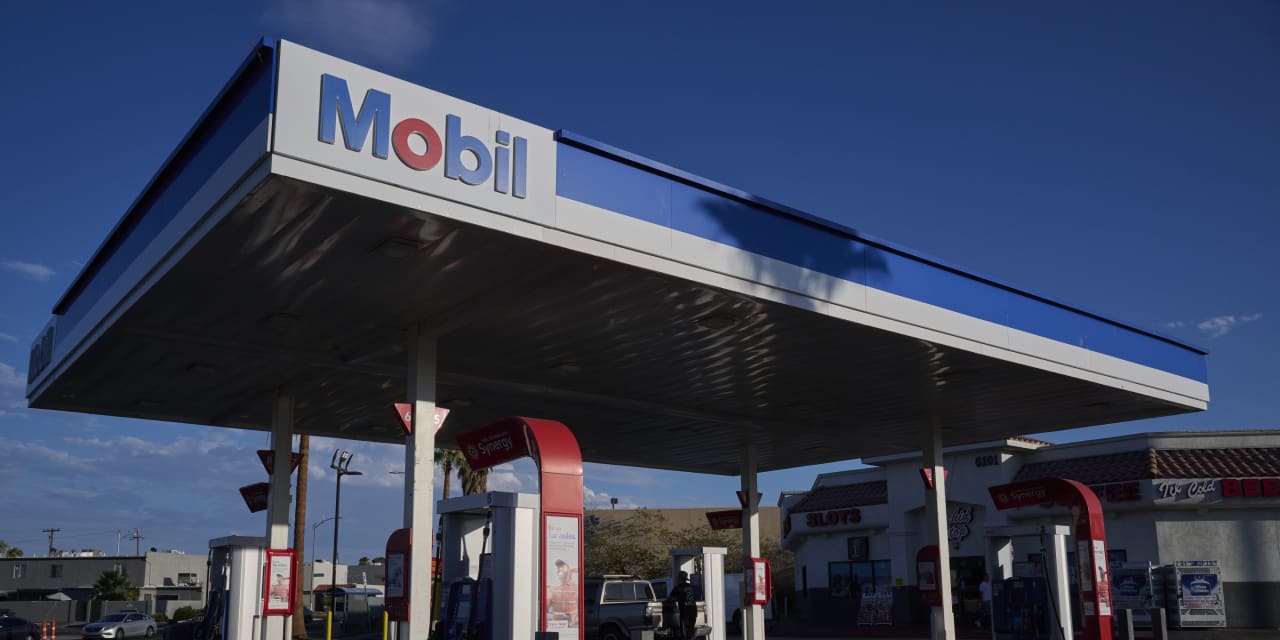Several large corporate acquisitions are set to close, so the takeover arbitrage community has been hoping for a big new transaction that would offer a way to put money to work. It got an enormous one Wednesday with Exxon Mobil’s agreement to buy Pioneer Natural Resources.
But the oil merger doesn’t look lucrative for many arbitragers seeking to gain from the gap between what
Exxon
(ticker: XOM) is offering for Pioneer (PXD) and where the shale-oil company’s stock is trading.
Exxon is buying Pioneer in an all-stock deal valued at $59.5 billion, or $253 a share, based on Exxon’s closing price on Oct. 5. The oil company is offering 2.3234 of its shares for each Pioneer share. Exxon shares finished Wednesday down 3.6% to $106.49., while Pioneer stock was up 1.4% to $240.82.
That means the value of the Exxon offer is about $247 a share, a roughly 2.5% premium to Pioneer’s stock price. That 2.5%, known as the arbitrage spread, looks small.
Exxon has said it expects to close the transaction in the first half of 2024. Assuming the deal closes around March 31, investors would earn a roughly 5% annualized return, Barron’s estimates.
That is less than the 5.5% rate on the six-month Treasury bill, and there is a risk that the deal doesn’t occur. Many arbitrage spreads this year have offered double-digit annual returns.
Professional arbitrage investors, however, calculate a higher annualized return of around 10% because of dividends on Pioneer stock and other payments. Figuring out that return is complicated because Pioneer pays a variable dividend tied to profits. Someone putting on the arbitrage would buy Pioneer and sell short Exxon. The arbitrager would have to pay the dividends on the Exxon short position.
Another issue is that institutions can get so-called rebates of about 5% on their short positions in Exxon. That would add to the returns available to professional arbitragers. Two arbitragers tell Barron’s that taking into accounts dividends and the short rebate, a professional arbitrager could earn a roughly 10% annualized return.
That return, however, likely would be unavailable to retail investors, reducing the appeal of the Pioneer arbitrage to the general public.
The best-case return on the Exxon/Pioneer deal, for either professional or retail investors, is below those that arbs have earned on
Microsoft
‘s (MSFT) deal for
Activision Blizzard
(ATVI) and
Broadcom
‘s (AVGO) deal for
VMware
(VMW), both of which are due to close this month. Arbs try to get a return of at least a few percentage points above risk-free Treasury bills to compensate for the risk.
Whether the deal happens at all isn’t certain. Exxon CEO Darren Woods told CNBC on Wednesday morning that he doesn’t anticipate any regulatory objections, but it is possible that President Joe Biden’s activist antitrust team, notably Lina Khan, the chair of the Federal Trade Commission, could look to challenge the transaction.
The longer the deal takes to close, the lower the returns for arbitragers. If the deal doesn’t happen, Pioneer stock could drop 10% or more. It doesn’t look like another bidder will emerge to prop up the price.
Before Biden, one arbitrager told Barron’s, the deal likely wouldn’t have generated much scrutiny given the fragmentation of the U.S. energy business. But there is no great love for Exxon and Big Oil in the administration: Biden said last year that Exxon “made more money than God.”
All that could leave the takeover arbitrage community still looking for deals to put to work funds that have been tied up in trades linked to other transactions.
Amgen
recently closed on its $28 billion deal for Horizon Therapeutics and the Microsoft and Broadcom transactions are due to close this month.
Microsoft is paying about $75 billion for Activision Blizzard while Broadcom is paying a similar amount for VMware.
It isn’t clear whether the selloff in Exxon shares is related to arbs buying Pioneer and selling short Exxon to lock in a spread. There also could be displeasure among investors that Exxon is doing a big all-stock deal and potentially overpaying. Exxon will issue about 540 million shares, or about 14% of its currently outstanding shares, Barron’s estimates.
It doesn’t seem likely that investors are disappointed by the price. The deal values Pioneer at little more than 11 times its projected 2023 earnings.
But it is notable that Exxon is using all stock in the deal, choosing not to take on debt in order to pay with cash. The company had only about $12 billion of net debt at the end of the second quarter, so it could easily have borrowed the entire price. That likely would have made the transaction more accretive to earnings, even accounting for how higher Treasury yields would have boosted Exxon’s borrowing costs.
Write to Andrew Bary at [email protected]
Read the full article here


